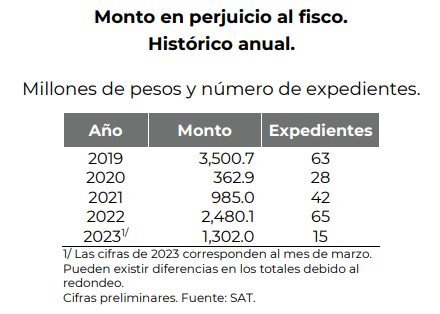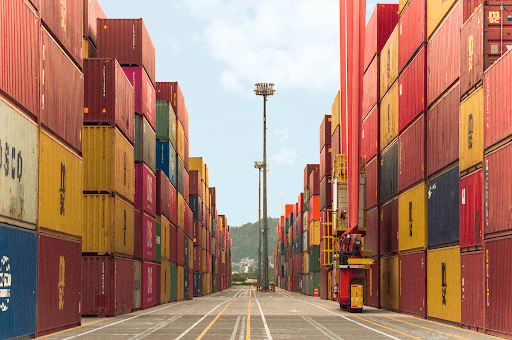Mexico‘s Ministry of Finance and Public Credit (SHCP) released data on the administrative files filed for criminal charges in foreign trade matters.
As of the first quarter of 2023, 15 administrative proceedings have been filed, the amount of which is 1,302 million pesos, representing 52.5% of the total amount observed for the same period of 2022 (2,480 million pesos).

The SHCP also informed that 7 administrative files were filed before the General Legal Administration (1 for smuggling, 3 for presumption of smuggling, 2 for equivalent smuggling and 1 for vacating or disappearance of the tax domicile), for their analysis and, if applicable, processing as criminal matters, whose total amount of damage to the Treasury amounted to 209 million pesos.
Likewise, 8 administrative files were filed before the Federal Tax Attorney‘s Office for the equivalent of tax fraud (one of them related to Hydrocarbons) for a total amount of 1,093 million pesos.
The Tax Administration Services (SAT) carries out control processes that seek to reduce illicit trade and position the country on a par with international best practices.
In this sense, SAT maintains an exchange of information with other tax and customs administrations to jointly combat commercial fraud and inhibit smuggling, money laundering and fraud.
Administrative files
On the other hand, as of the first quarter of 2023, 54 suspensions from the importers’ registry have been requested, among the main reasons for such suspensions are having an address not located (29 taxpayers), for not carrying out foreign trade operations in a period exceeding 12 months (19 taxpayers), for non-compliance with the used vehicles decree (19 taxpayers), for failure to file tax returns or any other tax obligation (6 taxpayers).
The formulation and implementation of trade policy continues to be the responsibility of the Ministry of Economy (SE).
It collaborates with other Ministries to develop a comprehensive policy of trade openness and promotion and attraction of foreign investment. It collaborates mainly with the Ministries of Foreign Affairs (SRE), Finance and Public Credit (SHCP) and Agriculture and Rural Development (SADER), as well as with the Ministries of the Environment and Natural Resources (SEMARNAT), Energy (SENER), Tourism, Health (SSA) and Defense (SEDENA).
Local governments and stakeholders are also consulted in the formulation of trade policy.

